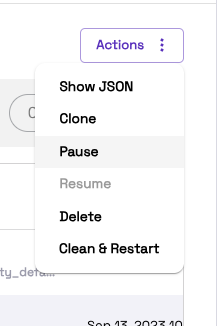Deleting a Onehouse Project
Overview
If you wish to delete a Onehouse project, the following steps will show how to cleanly delete projects. Included are the steps to:
- Stop all active ingestion via the Onehouse product
- Delete all sources in the Onehouse account
- Delete Linked Cloud Account
- Delete the Onehouse project
- Delete the Onehouse onboarding stack
Stop all active Onehouse ingestion
Onehouse manages ingestion via Stream Captures. To delete your project, delete all active Stream Captures in your environment. This can be found from the drop down menu under Actions in the top right corner of the Stream Captures page.

Delete all sources in the Onehouse account
Onehouse establishes access permissions to your cloud environment when sources are created. To delete your Onehouse project, delete all the data sources. This will not delete the data sitting in your cloud accounts, it will just delete any accesses or queues that the Onehouse product uses to ingest the data. This can be found from the drop down menu under Actions in the top right corner of the Sources page.
Delete Linked Cloud Account
By deleting the linked cloud account, it will delete the connection between Onehouse and the cloud provider and also destroy the kubernetes cluster created by Onehouse.
Delete the Onehouse project
Go to Setting -> Project Settings and click on "delete this project".
Delete the Onehouse onboarding stack
There are three methods to delete the Onehouse onboarding stack:
- If you used Terraform to initiate the onboarding process, you can dismantle all created Onehouse roles and resources by navigating to the Terraform directory and executing the
terraform destroycommand.
cd aws-terraform-stacks/terraform
terraform init -migrate-state
terraform destroy
-
If you used AWS CloudFormation to initiate the onboarding process, you can dismantle all created Onehouse roles and resources by navigating to AWS CloudFormation and deleting the relevant stack.
-
To remove all AWS resources created by Onehouse, search for resources with the 'RequestIdPrefix' and delete them manually. Specifically, in the IAM console, locate and delete the 4 IAM roles beginning with 'onehouse'.